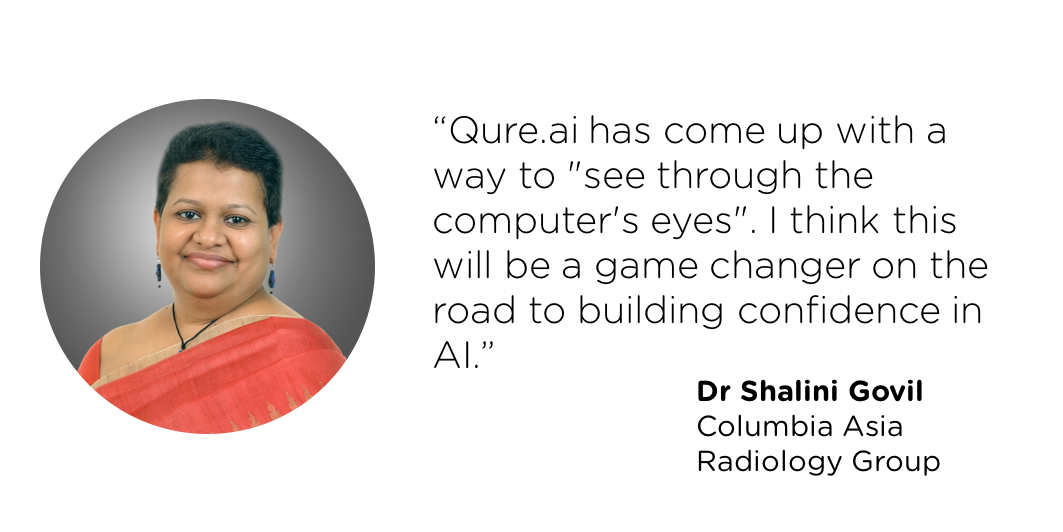Interview with Dr Shalini Govil - Training Artificial Intelligence to Read Chest X-Rays
Dr Shalini Govil is the Lead Abdominal Radiologist, Senior Advisor and Quality Controller at the Columbia Asia Radiology Group. Through her years as Associate Professor at CMC Vellore, Dr Shalini Govil has taught and mentored countless radiologists and medical students and continues to do so. Nowadays, she is busy training a new student – an Artificial Intelligence system that is learning to read Chest X-rays. Dr Govil is an accomplished researcher having published 30+ papers, and has won numerous awards for her contributions to Radiology.
Q&A with Dr Shalini Govil on artificial intelligence in radiology.
How do you see Artificial Intelligence in radiology evolving in the future?
Given the accuracy levels being reported across the world for deep learning algorithm diagnosis on imaging, I am sure AI has the potential to emerge as a strong diagnostic tool in the clinical armamentarium.
The only factor that could stand in the way of this progress is the very human fear of being “replaced”, “overtaken” or “made redundant”.
I feel that any crossroad like this in the practice of Medicine is best approached from the point of view of the patient and not from the viewpoint of commerce or market forces. Medicine is not a “job”…Medicine is “healing”… Medicine…is a patient trusting you at a vulnerable moment in his/her life.
From that standpoint, it is very simple - if AI is as accurate as a Senior Radiology Resident or even more accurate, let the patient have the benefit of a timely and accurate DRAFT report that can be validated by a physician or radiologist. This would certainly be better than the current practice in many parts of the world where the x-ray is not formally reported by a trained Radiologist or even a Trainee Radiologist.

How far away is the industry from realizing these goals, and how does Qure compare to similar solutions that you may have seen/ implemented?
Even as researchers are racing to study AI performance in increasingly complex pathology, widespread and parallel clinical testing is the need of the hour, to build confidence in Radiology AI and to obtain to a critical mass that will allow the threshold of human fear to be crossed.
Qure.ai has come up with a way to “see through the computer’s eyes”. I think this will be a game changer on the road to building confidence in AI. Whenever I have discussed the work I am doing on the use of AI in chest x-ray diagnosis with doctors, they tend to get a glassy look that says, “This is impractical…it’s never going to come into clinical use…”
But the minute they see a chest x-ray with the Qure.ai heatmap shading the abnormality that the AI actually “picked up”…the glassy look turns into one of wonder…because it is exactly what the doctor sees himself! I find this happens with lay people as well, even high school kids!
How do you think the Qure CXR solution can help or is helping radiologists in their practice?
Once the algorithm has been trained on a large number of chest x-rays and robust clinical testing has demonstrated a low false negative rate, I think the best use of the Qure.ai CXR solution would be to run all chest x-rays in our practice through the algorithm and obtain a DRAFT report to ease validation by a Radiologist.
What is your advice to young radiologists who are just getting started on their career? How should they think about adopting AI in their practice and what should they learn to succeed as a radiologist 10-20 years from now?
I would tell young Radiologists that help is on the way…that the days of struggling without a mentor when viewing a difficult case are over…that very soon, an “App” will help them derive a keyword tag to the image that has confounded them and that this keyword will then enable them to research and read and provide an articulate and lucid differential diagnosis.
What should they learn? They should learn Radiology of course…as in-depth and in-breadth as has ever been done…and they possibly can…. But they should also learn the basics of neural networks, deep learning algorithms and keep abreast of evolving AI. Oh! and another thing - it might be a good idea to brush up on their 12th grade calculus!